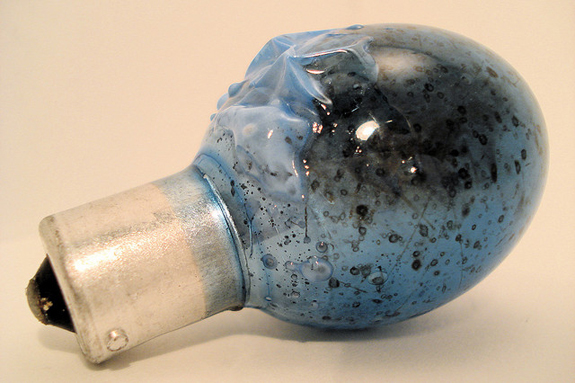Twelve Dead In Colorado Theater Shooting

Recollections of traumatic events, once considered accurate “flashbulb memories,” are now thought less reliable. Photo: Scout Seventeen
Armed with an automatic rifle, a shotgun, a handgun, and what witnesses describe as tear gas or a smoke bomb, a gunman opened fire on a crowd attending an early-morning showing at the Century Aurora 16 theater in Aurora, Colorado, killing 12 people and injuring 38 others, including children, report CNN and Reuters. The police took a local man, believed to be the shooter, into custody outside the theater, whom they believe was acting alone.
CNN describes the harrowing ordeal,
Police said the gunman “appeared” in the front of the theater and threw a smoke bomb before opening fire… One movie-goer, who was not identified, told KUSA the gunman was wearing a gas mask. Some people in the audience thought the thick smoke and gunfire was a special effect accompanying the movie, police and witnesses said.
Reuters describes the shooter being armed with a knife and one handgun, and confusion abounds around the sequence in which the event unfolded. One witness said the shooting took place within minutes of the movie’s start. Another said the movie had been underway for nearly 20 minutes. Reuters adds,
CNN quoted one witness as saying he saw a “guy slowly making his way up the stairs and firing, picking random people.” Another witness said the gunman opened fire during a shoot-out scene in the movie, leading to confusion.
As medical teams fight to save the wounded, investigators will likely have quite a difficult time piecing together an accurate idea of what really went on in the Aurora theater. As Ingfei Chen describes in Scientific American,
Decades ago, psychologists theorized that the brain imprints such details into its memory, like a photograph, when we learn of sudden, tragic national events. These highly emotional recollections were dubbed “flashbulb memories”—but the notion of photographic accuracy didn’t bear out in later research.
In an interview between Chen and New York University psychologist Elizabeth Phelps, Phelps said,
Emotion kind of focuses you on a few details but lets you ignore other details. And if you are highly aroused by fear, that emotion helps you store things in your memory better, in a storage process called consolidation that depends on the interaction of the amygdala and hippocampus. But what we’ve known for a while is that emotion gives you a stronger confidence in your memory than it does necessarily in the accuracy. Usually, when a memory has highly vivid details and you’re confident in those details, that means you’re likely to be right. Confidence often goes hand in hand with accuracy. But when something is highly emotional, they often get separated.
More from Smithsonian.com:
/https://tf-cmsv2-smithsonianmag-media.s3.amazonaws.com/accounts/headshot/smartnews-colin-schultz-240.jpg)
/https://tf-cmsv2-smithsonianmag-media.s3.amazonaws.com/accounts/headshot/smartnews-colin-schultz-240.jpg)